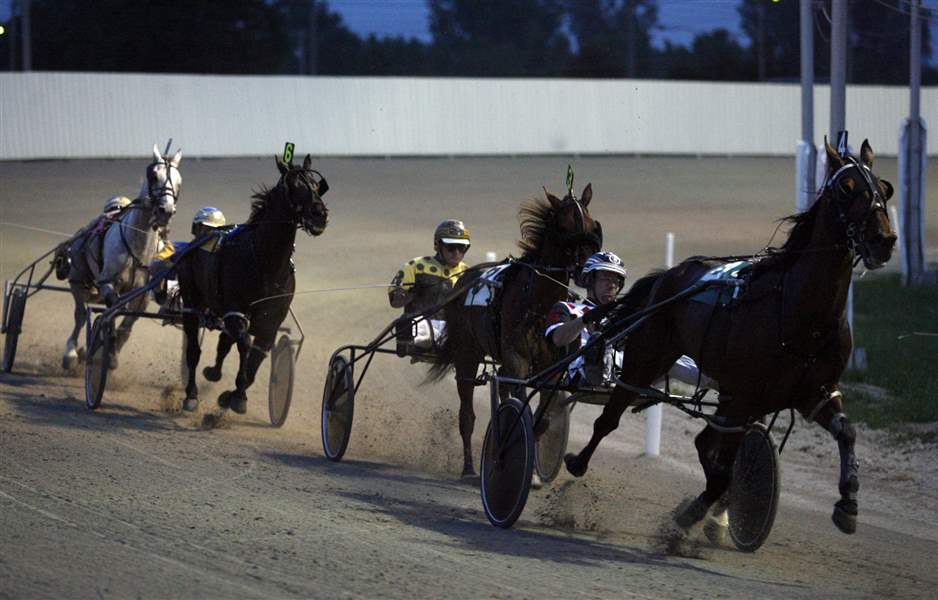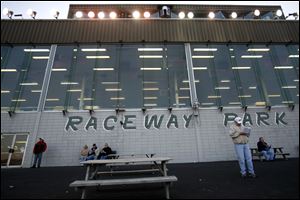
Raceway Park exit gains ground
Kasich, owner agree on $75M to shift track from Toledo to Dayton
3/16/2012
Casino developer Penn National plans to relocate the Raceway Park harness-racing track from Toledo to Dayton.
The Blade
Buy This Image

Casino developer Penn National plans to relocate the Raceway Park harness-racing track from Toledo to Dayton.
COLUMBUS — The move of Raceway Park out of the shadow of the new Hollywood Casino Toledo is still not a sure bet, but a deal struck Friday between Gov. John Kasich and the track's owner cleared some of the obstacles.
Pending litigation has prevented the setting of any firm timetable, but the latest deal lets Penn National Gaming Inc. know how much it would pay in fees to relocate two tracks -- $75 million each. It also gives the Wyomissing, Pa.-based gambling corporation assurances that the state won't approve any competing gambling entity, including a new racetrack, within 50 miles of its casinos or its new slots-equipped "racinos."
PHOTO GALLERY: History of Horse Racing in Toledo
The final decisions rest with the Ohio State Racing Commission.
"The public will benefit to the tune of $150 million, and it's really great news … " Mr. Kasich said. "We've worked on it a long time, but we didn't want to give away the store."
Until its move to Dayton takes place, Raceway Park, a Toledo fixture since 1959, will continue operations, said Eric Schippers, a Penn National senior vice president. The track is to open its live-racing season April 30.
"A lot of it is out of our hands -- the litigation playing out that was filed by the Ohio Roundtable against the state over [video lottery terminals] and the Senate debate detailing numerous provisions affecting VLTs," he said. "We're also still negotiating over the takeout payments to support racing."
Mr. Schippers said that under consideration is carving out 11 percent of slots revenue to supplement race purses, something the industry has insisted is necessary to make Ohio racing more competitive with neighboring slots-equipped states. That would be on top of the 33.5 percent tax the tracks will pay.
"At first glance, it means two new racing facilities, which is good," said Jerry Knappenberger, general manager of the Ohio Harness Horsemen's Association. "But having now two harness tracks in the Dayton area is not going to serve members of our association as well as having one in the southwest and one somewhere in the northwest."
In addition to the move of Raceway Park to Dayton, Penn National plans to move its Beulah Park thoroughbred track from the Columbus suburb of Grove City to Austintown, just outside Youngstown.

Penn National Gaming Inc., owner of Toledo's Raceway Park, maintains that the slot machines to be installed at the track would directly compete with Hollywood Casino Toledo. Live racing is to open April 30.
Meanwhile, the $300 million Hollywood Casino Toledo is expected to open Memorial Day week on the East Toledo riverfront near Rossford, and its Columbus counterpart will follow later this year. Penn National maintains that the slot machines to be installed at the existing tracks would directly compete with its casinos.
Penn National plans to spend $200 million to develop each "racino" in Dayton and Austintown and says the moves will create 3,000 direct and indirect jobs. The company has promised that the 110 full and part-time employees at Raceway Park will get priority for hiring at the nearby casino.
The noncompetition clause included in the Kasich memorandum-of-understanding was critical to Penn National as the racing commission considers license relocations. Exceptions include Lebanon Raceway, a harness track planning to relocate within the 50-mile radius of the proposed Dayton track, Scioto Downs, a harness track already within the Columbus market, and thoroughbred Thistledown outside Cleveland, which is considering a move to Akron.
Penn National has said combined revenues from its Toledo casino and a nearby slots-equipped Raceway Park would be $867 million a year and would generate $340 million in state and local gaming taxes. That would jump to $1.3 billion in revenue and $549 million in taxes if the two facilities did not compete with one another.
"I'm certainly not surprised that the governor is trying to maximize the state's share," Rep. Matt Szollosi (D., Oregon) said. "However, I believe Raceway Park could have and would have been successful along with the Hollywood Casino in Toledo.
"In tandem, they would certainly have made Toledo more of a point of destination, but Raceway's closure is a direct result of the company's desire to maximize their profits through the use of video slot machines," he said.
A lawsuit filed in Franklin County by the Ohio Roundtable, a staunch gambling opponent, challenges the constitutionality of the state pursuing slot machines as an extension of the Ohio Lottery.
"It allows for the governor to pick winners and losers, to pick seven locations as the only new lottery agents … " said Rob Walgate, vice president of the roundtable. They have a back-room handshake, and they've gone around the backs of voters to do it."
Contact Jim Provance at: jprovance@theblade.com or 614-221-0496.